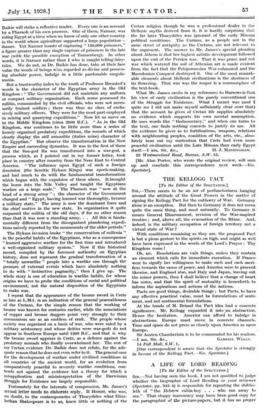THE KELLOGG PACT [To the Editor of the SPECTATOR.] SIR,—There
seems to be an air of perfunctoriness hanging around the attitude of the Great Powers in the matter of signing the Kellogg Pact for the outlawry of War. Germany alone is an exception. But then to Germany it does not mean quite the same thing, and most naturally. To Germany it means General Disarmament, revision of the War-inspired treaties ; and, above all, the evacuation of the Rhine. And, indeed, is the military occupation of foreign territory not a virtual state of War ?
With conditions remaining as they are, the proposed Pact is but a pious gesture to the spirits on high, and might as well have been expressed in the words of the Lord's Prayer : Thy Kingdom come 1 Oh, no. Resolutions are vain things, unless they contain an element which calls for immediate execution. If France - were to signify her willingness to make such and such sacri- • flees towards the cause of peace, and America were to proceed: likewise, and England also, and Italy. and Japan, leaving out the minor powers, then I shall believe that a change of heart has conic, and that the spirit of mutuality is henceforth to inform the aspirations and actions of the nations.
Pacts are good things, desirable things ; but Pacts, to have . any effective practical value, must be formulations of senti- ment, and not sentimental formulations.
At the hands of M. Briand the Pact idea had a concrete significance. Mr. Kellogg expanded it into :an abstraction. Hence the hesitation. America can afford to indulge in abstractions. Europe must move in concrete channels. Time and space do not press so closely upon America as upon Europe.
Sir Austen Chamberlain is to be commended for his realism.
[Our correspondent is aware that the Spectator is strongly in favour of the Kellogg Pact.—En. Spectator.]




































 Previous page
Previous page